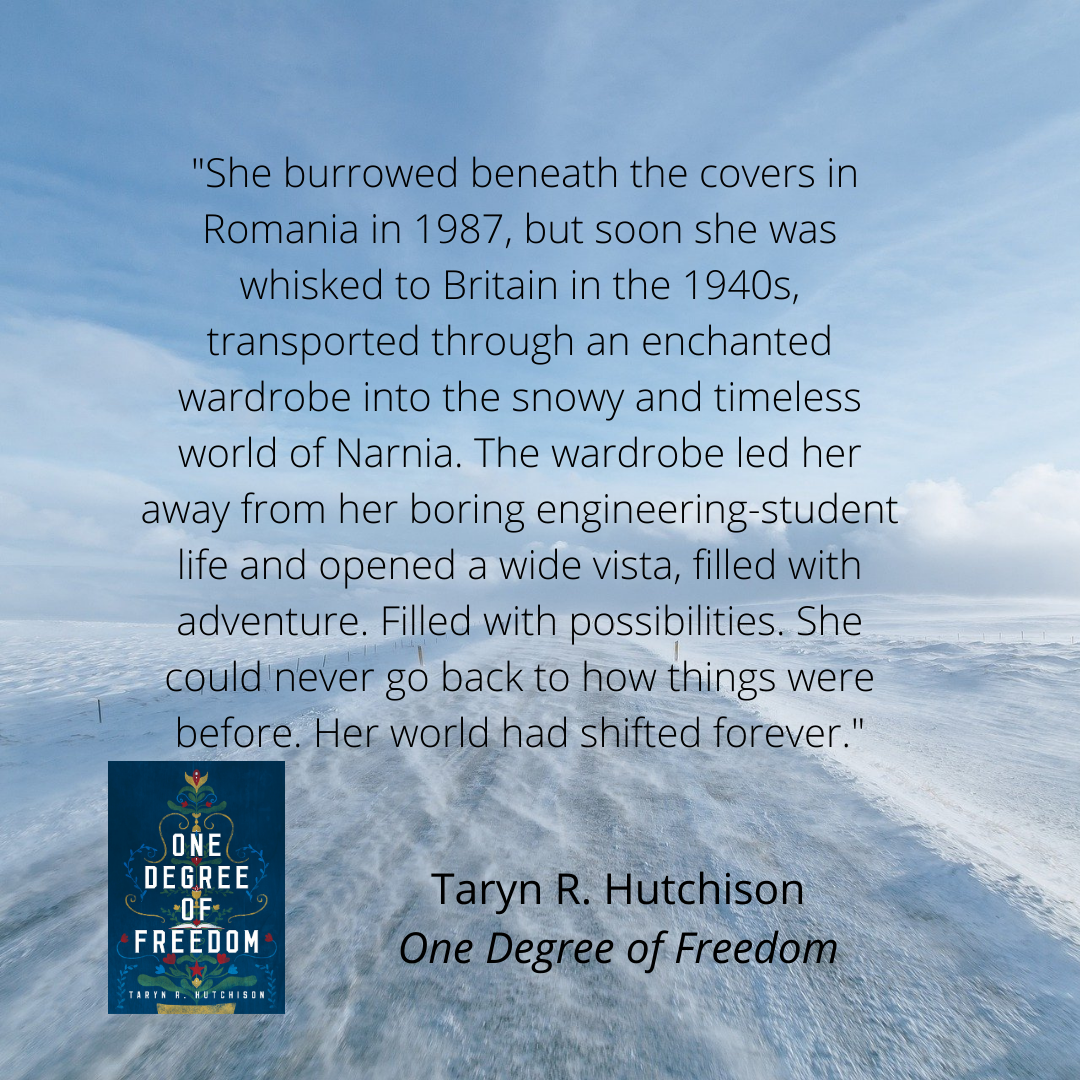
Photo thanks to Sarah Richter from Pixabay
I’m so honored that an excerpt from One Degree of Freedom, my YA historical novel, was featured in July’s Fabulous Fiction edition of The Redbud Post. Click here to read it at The Post.
Fifteen-year-old Adriana Nicu lives in the sheltered world of Bucharest, Romania, in the year 1987. Under the rule of Communist president Nicolae Ceaușescu, citizens of Bucharest live with the eyes and ears of the government ever present. Adriana’s future, which will involve becoming an engineer, is locked in against her will.
During a visit to her aunt’s apartment, Adriana walks through a wardrobe into a hidden room filled with stacks of forbidden novels. Stories bring light into the darkest of circumstances as her family begins to unravel and her life strangely parallels those of her novels’ heroines. Adriana’s childhood loyalties and her belief that God doesn’t exist are called into question as her circumstances force her to rethink things she once believed were certain.
Sometimes it only takes one small act to unchain a captive mind.
*******
When she knocked on the door, the peephole opened, and a magnified eye appeared.
“Adriana!” Her aunt opened the door and ushered her inside. “I was starting to worry.”
“I’m sorry, Aunt Violeta.”
“Come, before your tea gets cold.”
Adriana bent to remove her shoes, replacing them with well-worn slippers she plucked from the basket by the door. She hung her dark brown coat on a hook and padded after her aunt into the tiny kitchen, pulling out a wooden stool tucked under the square table. The peppery aroma of sarmale filled the space.
Violeta Zaharia poured tea into two chipped porcelain cups and slid the mint-green saucer of sweet crackers closer to Adriana. “I made sarmale special for your Uncle Mihai, but now he can’t come to dinner. The symphony has a special concert next month—”
“When’s he coming home?”
“Who knows? The violinists stay till it’s perfect. Maybe all night.” Violeta studied her niece. “You look—I don’t know—out of sorts. What is it?”
“I got caught daydreaming in school. Again.” She rolled her eyes. “Science is so boring. I don’t like it one bit.”
“If you could study anything—”
“I like words.” She surprised herself how quickly the answer came. “Stories. I like art. Anything but science.”
“I see.” Violeta sipped her tea.
“Mama says the State needs good engineers. That I should be happy and honored to have been chosen. That loyal Romanians show their gratitude to the Republic—they take such good care of us—by studying hard and excelling. But I don’t—”
“Adriana, your mother is right. Enough of that talk.” Violeta stood and clicked on the transistor radio. “I’ll call her.”
Adriana slumped on her stool. In trouble again. Twice in one day.
Her aunt picked up the black telephone receiver from its cradle, dialed the numbers by heart, and winked at Adriana.
“Da?” A voice crackled over the static-filled line.
“Ramona, it’s your sister. Adriana’s here, and Mihai isn’t, and well, I’ve got a pot of sarmale—”
Adriana could hear her mother’s response. “Of course. It’s not a school night. But I want her home before curfew.”
As her aunt hung up the phone, Adriana slid off her stool and hugged her.
Violeta cranked up the music’s volume and smiled. She put one finger to her lips and pointed with her other hand toward the front door. You never knew who might be on the other side, listening.
“Why don’t we put the crochet lesson aside for one week? The doilies can wait. Follow me.”
“Where?”
“I know what ails you,” she whispered. “You’re old enough now, and I think it’s time.”
They walked through the tall-ceilinged living room into the equally large bedroom. These old flats were much more spacious than the modern ones most people lived in, which was another reason Adriana preferred them.
“It’s inside here.” Violeta stepped into the massive blue wardrobe and submerged her entire body behind the hanging clothes.
Adriana could hear her rummaging around but couldn’t see her. She opened the doors wider to look. She parted the hanging clothes, sliding them to one end of the rod and then the other, exposing shelves of books and clothing and nothing else. No aunt to be seen.
“Aunt Violeta,” she whispered, urgently. “Are you there?” No answer came.She stood there, gaping. Aunt Violeta had vanished.
Suddenly, her aunt’s hand appeared from out of the darkness of the wardrobe, followed by her body. She shook herself free of hanging clothes and stepped into the bedroom, clutching something against her chest.
“Where … What …”
Aunt Violeta laughed, as though nothing unusual had happened. “It’s deeper than it looks.”
Adriana’s head pivoted, first to her aunt, then to the wardrobe, and back again.
“But—”
Aunt Violeta lowered her voice, so much that Adriana strained to hear. “When I was young, younger than you, I also felt restless. Then I discovered another world. You’re fifteen now and I think you’re responsible enough.” She held out a paperback for Adriana to see.
“It’s a … book.”
“No, it’s more. This is a novel. Your ticket to another land.”
Adriana looked at the cover. Two children rode on the back of a racing lion. “The Lion, the Witch and the Wardrobe,” she read. “By C. S. Lewis.”
“The author,” Violeta whispered, “was British. The story takes place during World War II. It was translated into Romanian when your mother and I were young.”
“British? But Mama says I shouldn’t—”
“Aren’t you old enough to form your own opinions?”
Adriana knew to whisper back. “You mean this isn’t on the list of approved books?”
“No.”
“So, it’s—”
“Illegal.” Violeta tucked Adriana’s hair behind her ears. “Before I give it to you, you must promise me something.”
“What?”
“You must keep this a secret. You cannot tell anyone. Not about the book or where I keep it. Not even … especially not your parents.”
“I promise.”
Violeta’s gaze penetrated Adriana’s eyes. “The privilege of entering another world comes with a risk. You could get into big trouble—even be arrested—if you’re caught. Can you handle this?”
Adriana swallowed. She nodded and squeaked, “Yes.”
“You’re sure?”
“I’m ready. I know I am.”
Violeta held the treasure out to Adriana. “Then take your book and read.”
Adriana snuggled into her favorite wingback chair in front of her aunt’s balcony window. The gold brocade fabric, faded now, bore vestiges of its former elegance. She pulled the crocheted throw over her lap and parted the sheer curtains to bring more light to the page. Dusk had started to descend, but she’d be able to read for a while yet. She was used to that. No one turned lights on until it became fully dark, and even then, usually just one light for the entire flat. She looked up and noticed only one bulb in the many sockets of her aunt’s grand chandelier.
She opened the book to the first page and proceeded to fall in love. . .
******
Adriana sprinted to her flat, trying to outrun the encroaching night as she took the long route home. The streetlamps that guarded the neighborhood were unlit, like every other streetlamp in the city. Shadows camouflaged the soldier standing sentry at the corner, his rifle at attention, but Adriana knew where to find him. Her parents said the soldiers protected everyone from thieves and murderers, one more sign of President Ceauşescu’s care.
“Good evening, comrade,” Adriana said as she passed, keeping her head submissively lowered. Her heart pounded, knowing her pocket held something dangerous.
She made another turn before reaching Strada Cobalcescu and home. She entered her building, nodded toward the door where the lady who recorded the residents’ comings and goings lived, and checked to see if the lift was working. Broken as usual. It was probably faster to walk anyway, so she took the steps to her eighth-floor apartment.
Once home, Adriana hung up her coat and plopped onto the bench to remove her shoes and wipe them clean of dust.
“How was the sarmale?” Her mother appeared. “And what did you crochet tonight?”
“Delicious. Aunt Violeta had me practice the stitches I learned last week.” Adriana lined her shoes neatly beside her parents’ shoes under the bench. “She says I need to become perfect.” The lie tumbled out without any effort.
“My sister said that?” Mama raised her eyebrows. “You better hurry, draga. There’s still a little water left. I’m turning in early. I had a long day at the factory. Noapte buna.”
Adriana stepped out of her school uniform to take her bath, inspecting it as she did so. She found a button on her blouse to sew tighter and a spot on her skirt to clean before school, but she didn’t have to do that tonight. Tomorrow morning, she and Gabi would go to the park, and she would get to wear her one casual outfit.
When she climbed into bed, she turned on her dim light to devour more of her novel. She burrowed beneath the covers in Romania in 1987, but soon she was whisked to Britain in the 1940s, transported through an enchanted wardrobe into the snowy and timeless world of Narnia. The wardrobe led her away from her boring engineering-student life and opened a wide vista, filled with adventure. Filled with possibilities.
She could never go back to how things were before. Her world had shifted forever.
